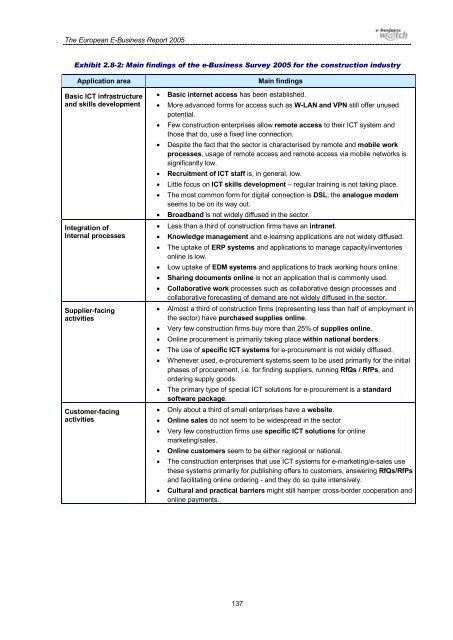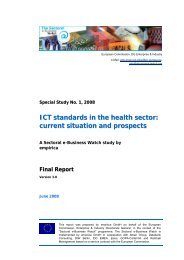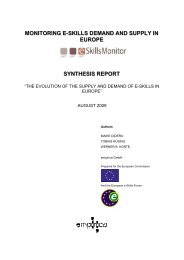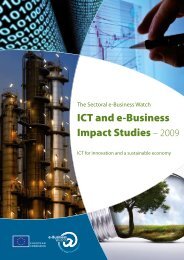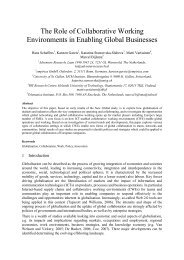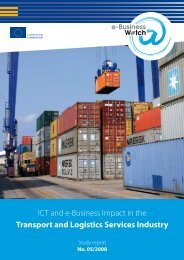The European e-Business Report The European e ... - empirica
The European e-Business Report The European e ... - empirica
The European e-Business Report The European e ... - empirica
You also want an ePaper? Increase the reach of your titles
YUMPU automatically turns print PDFs into web optimized ePapers that Google loves.
<strong>The</strong> <strong>European</strong> E-<strong>Business</strong> <strong>Report</strong> 2005<br />
Exhibit 2.8-2: Main findings of the e-<strong>Business</strong> Survey 2005 for the construction industry<br />
Application area<br />
Basic ICT infrastructure<br />
and skills development<br />
Integration of<br />
Internal processes<br />
Supplier-facing<br />
activities<br />
Customer-facing<br />
activities<br />
Main findings<br />
• Basic internet access has been established.<br />
• More advanced forms for access such as W-LAN and VPN still offer unused<br />
potential.<br />
• Few construction enterprises allow remote access to their ICT system and<br />
those that do, use a fixed line connection.<br />
• Despite the fact that the sector is characterised by remote and mobile work<br />
processes, usage of remote access and remote access via mobile networks is<br />
significantly low.<br />
• Recruitment of ICT staff is, in general, low.<br />
• Little focus on ICT skills development – regular training is not taking place.<br />
• <strong>The</strong> most common form for digital connection is DSL; the analogue modem<br />
seems to be on its way out.<br />
• Broadband is not widely diffused in the sector.<br />
• Less than a third of construction firms have an intranet.<br />
• Knowledge management and e-learning applications are not widely diffused.<br />
• <strong>The</strong> uptake of ERP systems and applications to manage capacity/inventories<br />
online is low.<br />
• Low uptake of EDM systems and applications to track working hours online.<br />
• Sharing documents online is not an application that is commonly used.<br />
• Collaborative work processes such as collaborative design processes and<br />
collaborative forecasting of demand are not widely diffused in the sector.<br />
• Almost a third of construction firms (representing less than half of employment in<br />
the sector) have purchased supplies online.<br />
• Very few construction firms buy more than 25% of supplies online.<br />
• Online procurement is primarily taking place within national borders.<br />
• <strong>The</strong> use of specific ICT systems for e-procurement is not widely diffused.<br />
• Whenever used, e-procurement systems seem to be used primarily for the initial<br />
phases of procurement, i.e. for finding suppliers, running RfQs / RfPs, and<br />
ordering supply goods.<br />
• <strong>The</strong> primary type of special ICT solutions for e-procurement is a standard<br />
software package.<br />
• Only about a third of small enterprises have a website.<br />
• Online sales do not seem to be widespread in the sector<br />
• Very few construction firms use specific ICT solutions for online<br />
marketing/sales.<br />
• Online customers seem to be either regional or national.<br />
• <strong>The</strong> construction enterprises that use ICT systems for e-marketing/e-sales use<br />
these systems primarily for publishing offers to customers, answering RfQs/RfPs<br />
and facilitating online ordering - and they do so quite intensively.<br />
• Cultural and practical barriers might still hamper cross-border cooperation and<br />
online payments.<br />
137


